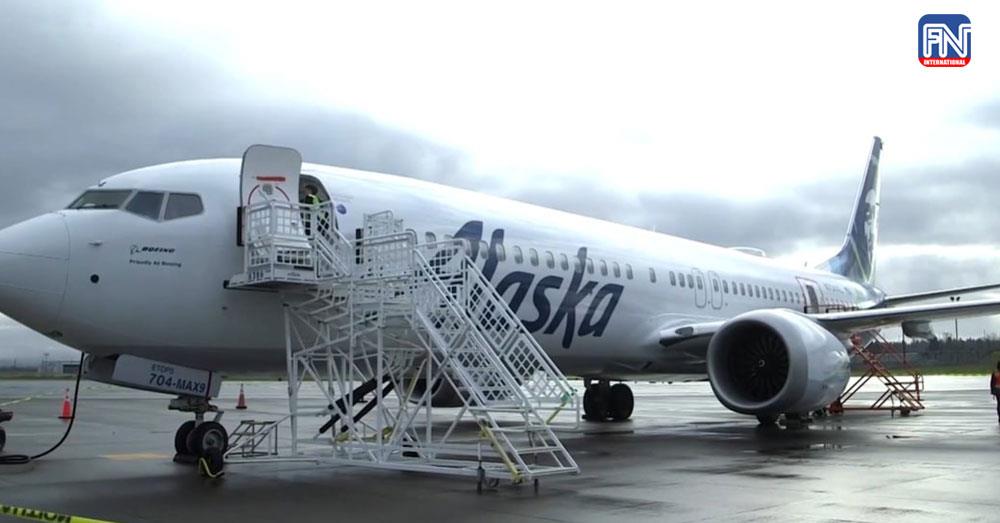WASHINGTON, Jan 9 (Reuters) - Boeing (BA.N) CEO Dave Calhoun on Tuesday addressed Friday's mid-air panel blowout from an Alaska Airlines jet, acknowledging the planemaker made a mistake and telling staff it would work with regulators to make sure it "can never happen again."
The statements were Boeing's first public acknowledgment of error since the incident on Friday left the 737 MAX 9 plane with a gaping hole.
Alaska Airlines and United Airlines, the two U.S. carriers that use the temporarily grounded planes, have found loose parts on similar aircraft, raising fears such an incident could have happened again.
In a separate meeting, Boeing told staff that findings of loose bolts in airplanes were being treated as a "quality control issue" and checks were under way at Boeing and supplier Spirit Aerosystems (SPR.N), sources familiar with the matter said.
Boeing has ordered its plants and those of its suppliers to ensure such problems are addressed and to carry out broader checks of systems and processes, they said.
“We’re going to approach this, number one, acknowledging our mistake," Calhoun told employees, according to an excerpt released by Boeing. "We’re going to approach it with 100% and complete transparency every step of the way."
Boeing shares fell 1.4% Tuesday as United canceled 225 daily flights, or 8% of its total, while Alaska canceled 109, or 18%. Similar cancellations were expected on Wednesday.
Calhoun also told Boeing employees the company will "ensure every next airplane that moves into the sky is in fact safe."
He praised the Alaska Airlines (ALK.N) crew that swiftly moved to land the 737 MAX 9 plane with only minor injuries to the 171 passengers and six crew.
Calhoun, who was a Boeing board member when all MAX jets were grounded worldwide in 2019, paid tribute to Alaska Airlines for quickly grounding its 737 MAX 9 jets, adding he knew "how hard it is to ground planes, much less the fleet," the sources said.
Calhoun said the accident had shaken Boeing customers and "shook me to the bone," the sources quoting him saying.
Boeing has suffered numerous production issues since the full-blown grounding of the 737 MAX family in March 2019 that lasted 20 months, following a pair of crashes in 2018 and 2019 that killed nearly 350 people.
The U.S. Federal Aviation Administration (FAA) grounded 171 planes after Saturday's incident, causing numerous flight cancellations. The panel that blew off Alaska Air Flight 1282 replaces an optional exit door on 737 MAX 9 planes used by airlines that have denser seating configurations.
Boeing has checked the service records of earlier Boeing 737-900ER aircraft that had a similar door plug, but all have undergone extensive maintenance since being delivered and none has shown a sign of similar problems, the sources said.
On Monday, Alaska Airlines and United Airlines (UAL.O) both said they had found loose parts on multiple grounded aircraft during preliminary checks, raising new concerns about how Boeing's best-selling jet family is built and its approval process.
The airlines have not yet started official inspections of their grounded aircraft. Boeing was still working out inspection guidelines to ensure safety lapses are fixed.
The FAA said Tuesday that Boeing was revising its instructions for inspections and maintenance, which the FAA must still approve before checks can begin on the 171 grounded planes. The FAA said it "will conduct a thorough review" and public safety will "determine the timeline" for returning the MAX to service.
Calhoun said Boeing had had a "very anxious moment with customers" and would have to "deal with that reality," one source said.
Boeing did not comment on any of his remarks beyond the extract issued by statement.
Boeing met delivery targets but ended 2023 in second place behind rival Airbus for the fifth year running, according to Boeing data and industry sources.
Boeing delivered 528 jets. Airbus will announce 735 deliveries for 2023 later this week, sources have said.
Boeing booked 1,314 net new orders, up 70%. However, the company faces an aggressive timetable for production.

Photo from Reuters




